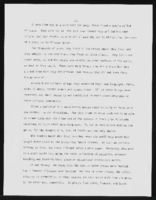Search the Special Collections and Archives Portal
Search Results

Transcript of interview with Walter Weiss by Claytee White, November 2, 2010
Date
Archival Collection
Description
In this interview, Walter Weiss discusses how Judaism and boxing kept him out of trouble in his youth. Weiss grew up in the Boston area, and started boxing as a teenager. Weiss talks about his boxing training, becoming a runner for a bookmaker, and coming to Las Vegas in the 1950s to be a bookmaker for the Stardust Hotel, and working the slot machine floor. He had several different jobs in various casinos, and discusses different people involved in the gaming industry in Las Vegas.
Walter Weiss life story begins in a Malden, Massachusetts during the Great Depression. His early background was a blend of observant Judaism, secularism, and the effects of the era. He was a troubled youth whose older brother encouraged him to join him in boxing. As Walter explains: I was a wild kid and ... boxing saved my life. His aptitude for boxing led him to be a sparring partner in New York City's famous Spillman Gym. There he met and worked out with some of the greatest fighters of the era, including Rocky Marciano. He recalls how he turned professional while attending the University of Miami and how he first came to Las Vegas in 1958 to escape his personal troubles and find work with a local bookmaker. Thus began his diverse employment history in the casino industry. He details his various positions and the cast of famous and infamous characters of the times. For six years he return to New York and worked as a Wall Street broker before arriving back in Las Vegas in 1973. He talks about his property ownership, lobbying for an amendment to Senate Bill 208, his personal religious changes and a sundry of observations about the changes that occurred as the state took over gaming.
Text

Transcript of interview with Rabbi Felipe Goodman by Barbara Tabach, March 9, 2015
Date
Archival Collection
Description
Rabbi Felipé Goodman was born in 1967 and raised in an established Conservative Jewish community in Mexico City. This community would financially and emotionally support his seminary education was in New York City at the Jewish Theological Seminary. As a young rabbi eager for his own congregation, he became restless in 1998 and began his search for options which lead him to a listing for a rabbi at Las Vegas’s oldest synagogue, Temple Beth Sholom. During this oral history, Rabbi Goodman weaves a fascinating story of chance and good fortune of his interview process and visit to Las Vegas—including the generous parting gift of Snapple—and his surprising decision to take the position. Now, almost two decades later, he reflects on several of his accomplishments in addition to being Temple Beth Sholom’s longest serving rabbi to date. He mentions the opening of the synagogue’s move to a beautiful new building in Summerlin, where they were able to include a mikvah for conversions. He shares how he and Rabbi Jeremy Wiederhorn, formerly of Midbar Kodesh Temple, worked together to establish chevra kadisha for burying Jewish people. As a member of the Rabbinical Assembly he was especially please to help host the 2011 annual conference in Las Vegas after years of persuasion. Israeli political leader Tzipi Livni was the keynote speaker. Rabbi also speaks about his passion for Israel, AIPAC and the Conservative Movement in Judaism.
Text

Untitled unpublished manuscript by Roosevelt Fitzgerald
Date
Archival Collection
Description
From the Roosevelt Fitzgerald Professional Papers (MS-01082) -- Unpublished manuscripts file. "Injustice Blacks Have Suffered…" ending with Naomi Long Madgett's poem "Midway."
Text

Transcript of interview with William Brymer by Rob Mullaney, March 9, 1979
Date
Description
Text
Sabina and Antonio E. Callwood oral history interview
Identifier
Abstract
Oral history interview with Sabina and Antonio E. Callwood conducted by Claytee D. White on October 13, 2014 for the Southern Nevada Jewish Heritage Project. This interview begins with Sabina Callwood's ordeal in the Holocaust in Belgium and her family's various experiences with the persecution. She recalls her adjustment to life after the war and talks about her family's history with Judaism, also giving some insight into Jewish culture, law, traditions, and customs. Antonio Callwood discusses his family genealogy and his career as a musician. The couple delve into their marriage in 1990 and their extensive travels for Antonio's music career as well as their eventual settlement in Las Vegas, Nevada in 2007. The Callwoods end the interview with a discussion of the Jewish community in Las Vegas and an awareness of how the new environment allowed them to explore their Jewish identities.
Archival Collection
Rabbi Felipé Goodman oral history interview
Identifier
Abstract
Oral history interview with Rabbi Felipé Goodman conducted by Barbara Tabach and Monserrath Hernandez on April 01, 2019 for the Latinx Voices of Southern Nevada Oral History Project. In this interview, Goodman discusses his upbringing in Mexico City, Mexico and growing up in the Jewish neighborhood of Polanco. He recalls trips to the United States, differences between Mexican Judaism and American Judaism, and moving to Las Vegas, Nevada in 1998. Later, Goodman talks about being Rabbi at Temple Beth Sholom, his connection to the Latinx community, and his story of becoming a United States citizen. Lastly, Goodman discusses his observations of anti-Semitism and attending the American Israel Public Affairs Committee (AIPAC) Policy Conference in 2019.
Archival Collection
Richards, Mustafa, 1950-
Mustafa Richards was born December 24, 1950 in Detroit, Michigan. He graduated from Murray High School located in Detroit. Although he was accepted to Wayne State University, Richards opted out of attending college and started his journey towards his study of multiple religions.
Person
Walter Weiss oral history interview
Identifier
Abstract
Oral history interview with Walter Weiss conducted by Claytee D. White on November 02, 2010 for the Boyer Early Las Vegas Oral History Project. In this interview, Walter Weiss discusses how Judaism and boxing kept him out of trouble in his youth. Weiss talks about his boxing training, becoming a runner for a bookmaker, and coming to Las Vegas, Nevada in the 1950s to be a bookmaker for the Stardust Hotel, and working the slot machine floor. He also talks about having several different jobs in various casinos, and discusses different people involved in the gaming industry in Las Vegas.
Archival Collection

Transcript of interview with Milton I. Schwartz by Claytee White, May 4, 2004
Date
Archival Collection
Description
In this interview, Milton Schwartz discusses his life in Las Vegas and his business investments. He worked at the Flamingo Hotel right after World War II, and he started Valley Hospital as an investor in 1970. Schwartz has a Hebrew academy named after him in Israel, and owned the Yellow-Checker-Star Cab Company. He was active in the Republican Party.
Milton I. Schwartz was born and raised in Brooklyn, New York. He enlisted in the Army the day after Pearl Harbor (age 20) and did a five year stint in the Pacific as a repeater specialist. After the war he returned to his job as a refrigeration mechanic in Brooklyn and was soon offered a job out in Las Vegas at the Flamingo Hotel, which was owned by Bugsy Siegel. After three months in Las Vegas, during which time he had several conversations over dinner with Beldon Cattleman, Milton returned to New York to work with his father in the fixture business. After ten years he sold that business and bought into Design Equipment Construction, which brought him back to Las Vegas. Milton started or bought many businesses over the years, but the one he's proudest of is Valley Hospital. He and his partners brought the first medical helicopters into Nevada and he feels that many lives were saved because of that. He also invested in Yellow-Checker-Star Cab Company, which he still owns. Two on-going concerns that are important to Milton are his involvement with the Republican Party and the Milton I. Schwartz Hebrew Academy in Israel. Of the many awards and plaques he has earned over the decades, he is proudest of the birthday acknowledgements from the Academy. He believes strongly that the most important achievements of his life revolve around his religion and the children being educated in it. Milton shares many stories, facts, descriptions, and anecdotes about Las Vegas in the decades since 1946. He built a house in the Scotch 80's, contributes to UNLV, and approves of city growth and the proposed changes in the downtown area. He has contributed much to the growth and stability of the Las Vegas valley.
Text

Transcript of interview with John Brooks by Jeff Kennedy, February 28, 1979
Date
Archival Collection
Description
Text
